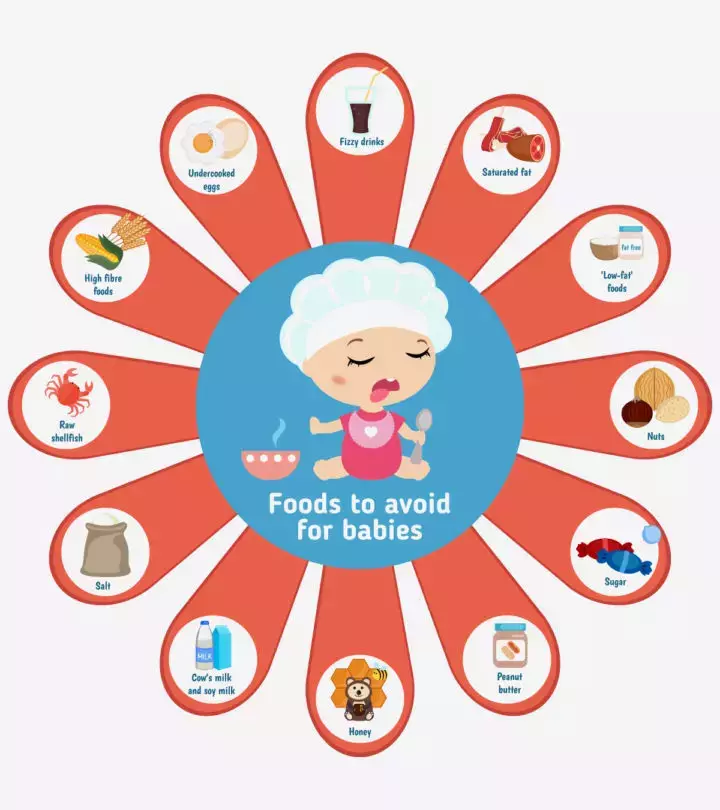
Image: Shutterstock
Four-month sleep regression results in a sudden change in sleep patterns that may cause worry in new parents.
It is a condition where four-month-olds, who had previously been sleeping well, suddenly begin waking up at night and have trouble falling back asleep.
Baby sleep regressions are characterized by unexplained disruptions in sleep patterns. They are frequently reported but rarely studied. Usually, these regressions coincide with the age for major developmental brain changes. While there is no staunch medical evidence for its occurrence, sleep regressions do occur according to anecdotal evidence.
The sleep regression phase can be difficult for parents and caretakers. It may last for a few days to a couple of weeks. However, it is a normal developmental phase.
Read this article to learn the signs of regression and how to handle your baby during this phase.
Key Pointers
- Rapid brain growth and development and sleep patterns can cause sleep regressions in babies in the 4th month.
- Problems with falling asleep, fussiness, and reduced total sleep time are some common signs of sleep regression.
- Looking for sleep cues, setting bedtime routines, and letting them explore their new skill may help manage this condition in infants.
Why Do Some Babies Go Through Sleep Regression?
Sleep regression can occur at any age, but it is most common at 4, 6, 8, 12, and 18 months. Not all babies experience sleep regression in their fourth month. Research states that there is a significant variation in the individual sleep patterns in newborns (1). Some babies may experience sleep regression due to the following reasons.
- Changing sleep patterns

The sleep patterns in newborns vary according to their age. Newborns tend to sleep for 14–16 hours a day in short intervals. By the age of four to 11 months, babies generally sleep for 12–15 hours a day (2). This change in sleep patterns during the fourth month might result in sleep regression in some babies, as the total time spent sleeping per day is reduced.
The graph below depicts the amount of sleep children need at different stages in their development as per The American Academy of Sleep Medicine’s guidelines. It is recommended to follow this schedule at all stages, as insufficient sleep can affect children’s psychological and physical well-being. As can be inferred from the graph, the amount of sleep required decreases with increasing age.

How much sleep do children need ?
Source: Healthy Sleep Habits: How Many Hours Does Your Child Need?; American Academy of Pediatrics/The American Academy of Sleep Medicine (AASM)- Rapid brain growth and physical growth
Sleep plays a vital role in an infant’s brain development. During sleep, their brain releases growth hormones, helping in growth and tissue repair. In some babies, sleep regression may be caused by the rapid growth of the brain, a physical growth spurt, or a developmental milestone, such as rolling over, grasping objects, or kicking their legs. The physical growth spurt could lead to frequent awakenings for feeding at night (3) (4).
- Awareness of their surroundings
During the fourth month, your baby becomes more aware of their surroundings and may make sounds such as “coos” and “ah-goos” (4) (5). They also start adjusting to daylight, artificial light, and feeding. Such developments may also result in sleep disruptions. As they become more aware of their surroundings they might wake up in between to check if the environment around them is safe. When something doesn’t feel right, they may not drift back to sleep and start crying.
 Quick fact
Quick factWhat Are The Signs Of Four-Month Sleep Regression?
Some babies may not show any signs of sleep regression, while others may have difficulty falling asleep at four months or later.
Here are a few signs of sleep regression to help you identify it (6).
- Frequent night waking or baby waking up every hour
- Difficulty in falling asleep
- Fussiness and frequent crying
- Reduced total sleep in a day

A four-month sleep regression could occur suddenly and out of the blue, causing worry to parents. It could also be hard on the parents as it leaves them sleep-deprived. But remember that sleep regressions are normal and are seen in healthy babies.
When Does The Four-Month Sleep Regression End?
Although it may feel perpetual, sleep regression does end in a few weeks. However, it depends on how well you manage it and help your baby get back to sleeping peacefully (6).
Read the next section to learn how to manage the four-month sleep regression in your baby.
How To Manage Four-Month Sleep Regression In Babies?
Sleep regression can be hard to handle because it is a sudden development in an otherwise peaceful sleeping baby.
It is important to help your baby fall back to sleep and try to develop a set sleep pattern.
There is no sure-fire way to reduce the four-month sleep regression in babies. However, parents may try the following sleep regression remedies.
1. Look for sleep cues.

During the period of four-month sleep regression, it is imperative that your baby catches up on some sleep. Try to identify your infant’s sleep cues, such as yawning, rubbing of eyes, fussiness, quietness, not wanting to play, crying, and clenched fists, and settle them to sleep (7).
2. Give them time to explore new skills.
At four months, your baby starts to learn new skills, such as reaching out to hold things and rolling over. It is best to give them time to explore and practice these new skills during the day so that they do not try to practice them when you lay them down to sleep at night.
3. Stick to a routine.
This step could be difficult when your baby is going through the four-month sleep regression. Nevertheless, try to stick to their regular bedtime routine. This might help them get back to a normal sleep cycle once the sleep regression ends.
Marian Thomas, a blogger and a mother, states, “At four months, our baby began waking every hour throughout the night. We were experiencing the ‘four-month sleep regression.’ Our pediatrician suggested it was a good time to sleep-train our baby. So we moved our son into our bed and nursed him to sleep on demand after taking all the safety measures outlined by the APA for this period. Our baby ended up developing a strong sleep association with nursing. Co-sleeping was a lifesaver because I could easily reach out to him when he woke and soothe him back to sleep without getting up (i).”
4. Attend to their needs quickly.
Your baby might wake up during the night due to hunger or a wet diaper irrespective of sleep regression. If your baby is crying because of these, make sure you attend to their needs as quickly as possible.
Make nighttime feedings and diaper changes quick, and avoid talking or playing with your baby when they wake up at night. Do not use a bright light or a mobile screen as it can stimulate the baby.
5. Create an optimal atmosphere.

Try to maintain a quiet and dark environment in the nursery. Make sure your baby feels safe in their crib such that even if they wake up in the middle of the night, they can learn to self-soothe back to sleep.
You could also give them a warm bath, massage them, play soothing music, minimize stimulation, and dim the lights at least an hour before sleep to help them fall asleep.
6. Help them self-soothe.
Some babies can soothe themselves back to sleep after waking up at night, whereas others need the caregiver’s help to soothe them. During the four-month sleep regression period, your baby might wake up multiple times during the night. If you rush to take them in your arms, your baby may get accustomed to it. Instead, help them self-soothe.
Do not lift your baby as soon as they cry. Sit by their side, try to hush them by gently patting them, and reassure them that everything is alright. If this does not work, you may pick them up and soothe them to sleep.
7. Feed them adequately.
Ensure your baby is adequately fed before you put them to bed, so they do not wake up at night due to hunger. At four months of age, your baby may not need frequent nighttime feeds, so stick to a strict feeding schedule. Do not use feeding to get them to sleep during the night awakenings, as it might become a habit.
Also, as your baby starts to pay attention to the world around them, it is easy to get distracted and stop feeding midway. Try eliminating distractions while feeding, and make sure they have a full tummy every time.
8. Be gentle with them.
It can be quite challenging to deal with the four-month sleep regression, but remember, it is a part of your child’s developmental process. Do not show anger or frustration towards your baby; instead, shower them with hugs, cuddles, and kisses to comfort them.
9. Seek help from family and friends.

Dealing with sleep regression takes a lot of patience and perseverance, and it is fine to feel overwhelmed at times. Whenever you think you cannot take it anymore, ask your family members or friends to take over while you get some alone time to reboot.
10. Identify the changes in sleep patterns.
During sleep regression, parents often worry if their baby is getting enough sleep. Now that your baby is four months old, they will sleep for 14–15 hours and take three to four naps a day, unlike the 16–17 hours of sleep when they were newborns (2). So, keep track of their sleep timings to avoid unnecessary worrying.
When To Call A Doctor?
Although four-month sleep regression is common, sometimes, there could be underlying medical conditions, such as colic and gastroesophageal reflux, which could lead to sleep disturbances in babies.
Contact your pediatrician if your baby is not gaining weight and also:
- Cries continuously, and no amount of soothing works.
- Has abnormal breathing, such as gasping for air during sleep.
- Is too lethargic and does not wake up for feeds.
- Has not developed expected milestones for their age or has lost milestones that they had previously attained.
- Shows major behavioral changes.
How To Cope With Sleep Deprivation?
While 4th-month sleep regression can be challenging, this phase is temporary as babies eventually establish longer sleep patterns. To navigate this challenging time, prioritize rest over worrying about actual sleep. Even a brief break or lying down can make a significant difference. Don’t hesitate to accept assistance from family and friends; now is not the time to shoulder unnecessary responsibilities.
Sharing parenting duties with your partner and taking turns for weekend lie-ins can enhance your fatigue management. Embrace outdoor activities for fresh air, daylight, and improved baby sleep. Nourish yourself with a well-balanced diet and gentle exercise. Social support through friends, baby classes, or NCT postnatal courses is vital for mental well-being. If sleep difficulties persist, consult your doctor to rule out any underlying issues (8).
Frequently Asked Questions
1. Do babies sleep better after 4-month sleep regression?
Babies may sleep better only if good sleep habits and a sleep routine are practiced.
2. Do I let my baby cry it out during sleep regression?
You may try the cry-it-out method to put your baby to sleep. However, you should continue checking on them and feed them if required (9).
3. How can I tell the difference between a growth spurt and a sleep regression?
A growth spurt usually lasts a few days. Babies are often fussier, may want to feed longer than usual, and may even sleep longer (10). In comparison, sleep regression may last up to a few weeks and mainly involves reduced sleep, difficulty in falling asleep, and frequent awakenings (6).
4. Should I sleep train during a regression?
Yes. You may sleep train your baby during a regression by putting them to bed when they are drowsy and avoiding interaction when they wake up to help them self-soothe to sleep (11).
5. Does the four-month sleep regression affect naps?
Sleep regressions can affect daytime naps. During regression, the baby may wake up from sleep frequently or have trouble falling or staying asleep (10).
Four-month sleep regression causes unexplained disturbance in the sleeping patterns of the baby. Progressive developmental changes and reduced sleep requirements with age may cause frequent night awakenings and difficulty falling asleep. Maintain a proper sleep routine and do not stimulate the baby by talking or keeping bright lights on when you identify their sleeping cues. Feed them properly before sleeping but avoid breastfeeding to help them fall asleep during the night awakenings, as it might develop into a habit. Take time off if you feel frustrated and seek help from family members as it may take some time to set things right.
Infographic: Ways To Manage Sleep Regression In A Four-Month-Old
An abrupt change in your infant’s sleeping pattern may cause concern and require you to reintroduce the sleeping schedule. Although there are many potential causes, including the brain development of the baby and heightened awareness of one’s surroundings, managing this sleep regression could be challenging. Check out the infographic below for helpful suggestions on handling a four-month-old’s sleep regression.

Illustration: Momjunction Design Team
Lately, have you been facing trouble getting your baby, who is a good sleeper, to fall asleep? This could be sleep regression. Watch this video to learn more about the 4-month sleep regression, including its causes, signs, and solutions.
Personal Experience: Source
MomJunction articles include first-hand experiences to provide you with better insights through real-life narratives. Here are the sources of personal accounts referenced in this article.
i. How I got my baby to sleep through the night with no tears;https://medium.com/@marianjthomas/how-i-got-my-baby-to-sleep-through-the-night-with-no-tears-7e098a298108
References
1. Jodi A Mindell, et al.; Development of infant and toddler sleep patterns: real-world data from a mobile application; Journal of Sleep Research (2016).
2. Elaine KH Tham, Nora Schneider, and Birit FP Broekman; Infant sleep and its relation with cognition and growth: a narrative review; Nature and Science of Sleep (2017).
3. Macall Gordon; From Safe Sleep to Healthy Sleep: A Systemic Perspective on Sleep In the First Year; University of Washington – School of Public Health (2018).
4. Your baby’s sleep at 3-6 months; Wirral Community Health and Care – NHS Foundation Trust
5. 3-4 months: baby development; Raising Children Network
6. 4-Month Sleep Regression; SleepFoundation
7. Sleep 0 – 3 months; Department of Health – Government of Western Australia
8. Coping with a lack of sleep with a newborn; NCT
9. The 4-Month Sleep Regression; What Parents Need to Know; Cleveland Clinic
10. Cluster Feeding and Growth Spurts; WIC Breastfeeding Support
11. Common baby sleep challenges; Geisinge
12. What Is Sleep Regression? How to Treat It? Oklahoma Otolaryngology Associates
Community Experiences
Join the conversation and become a part of our nurturing community! Share your stories, experiences, and insights to connect with fellow parents.
Read full bio of Dr. Pooja Parikh
Read full bio of Swati Patwal
Read full bio of Rohit Garoo
Read full bio of Vidya Tadapatri























